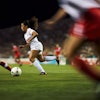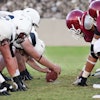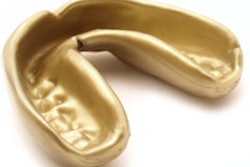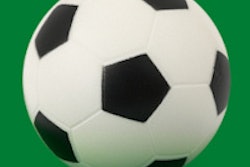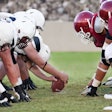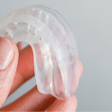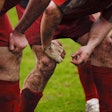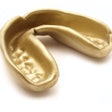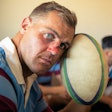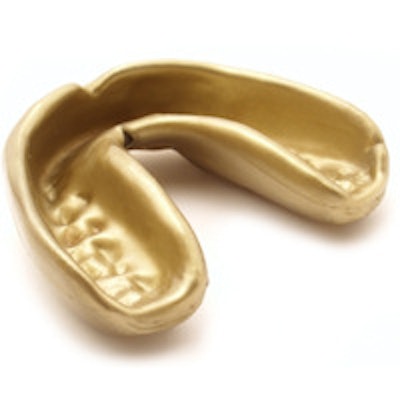
Adults who grew up playing hockey sometimes joke about the teeth they left behind at the rink. But think how much better their lives would have been with one small preventative measure: a mouthguard.
It's time to educate patients and parents about the importance of mouthguards, which will help prevent young adults from scheduling emergency dental appointments, along with other health problems.
Which athletes benefit from mouthguards?
 Leslie Townsend, DDS.
Leslie Townsend, DDS.
Some amateur sports, including hockey, lacrosse, football, and boxing, now require mouthguards. Local sporting associations and organizations have their own rules, which often require participants to wear mouthguards. But even if a mouthguard isn't mandated by a sport, it's a sound investment for most athletes. The American Dental Association has listed 29 different sports for which participants may need a mouthguard, including basketball, boxing, football, hockey, racquetball, soccer, weightlifting, and others.
Most important, though, are contact sports that carry risks of damage to the face. In 2011 study, a sizable percentage of the injuries in basketball -- a sport which isn't generally associated with mouthguards -- were orofacial. Soccer's emphasis on heading the ball also can result in dental impact (International Dental Journal, February 2011, Vol. 61:1, pp. 43-46).
Athletes who participate in sports involving possible crashes and falls also are good candidates for mouthguards. Skateboarders, mountain bikers, and gymnasts can all use mouthguards to protect their teeth.
Do mouthguards prevent concussions?
Football is in season, and we all know how exhilarating, yet dangerous, the sport has become. Football players continuously get hit in the head, with occasional blows that likely are the cause of concussions. Retired players often suffer from this later in life, but doctors are not exactly sure whether it's the thousands of tiny impacts to the head that cause this, or the singular, crushing blows to the brain.
A recent study has shown that custom-made mouthguards reduce the risk of concussion more than over-the-counter mouthguards (General Dentistry, May/June 2014). The ADA and the International Academy for Sports Dentistry recommend the use of a custom-fabricated mouthguards delivered under the supervision of a dentist.
“If patients or parents inquire about mouthguards, let them know about the difference between over-the-counter and custom.”
In addition, bioengineers at Stanford have developed a mouthguard equipped with accelerometers that measures the impact players sustain during practices or games. So far, they've seen that players' heads frequently sustain accelerations of 10 g forces. With these types of impacts, it's important that football players (and contact sport athletes) wear a mouthguard to prevent further damage to the brain.
If patients or parents inquire about mouthguards, let them know about the difference between over-the-counter and custom-made. Here are a few things you can point out: Custom-fitted mouthguards are made by a dentist. An impression will allow you to accurately assess a patient's mouth and provide the best-fitting mouthguard for them. There are plenty of benefits, including comfort, proper fit, and ease of speech, and it likely will not restrict the patient's breathing.
Over-the-counter mouthguards are less effective. These come in two main types: stock mouth protectors and boil-and-bite. Stock mouth protectors are the least expensive and generally come in small, medium, and large. The athlete must constantly bite down to keep the stock mouthguard in place, which can lead to trouble breathing and talking. Stock mouth protectors offer little, if any, protection.
Boil-and-bite mouthguards are slightly better, but they're still not as effective as custom-made ones. This type of mouthguard is put into hot water to soften it, then impressions are made by biting into the thermoplastic material and molding it around the teeth.
Leslie Townsend, DDS, practices at Jefferson Dental Clinics in Dallas. Dr. Townsend can be reached at [email protected].
The comments and observations expressed herein do not necessarily reflect the opinions of DrBicuspid.com, nor should they be construed as an endorsement or admonishment of any particular idea, vendor, or organization.
